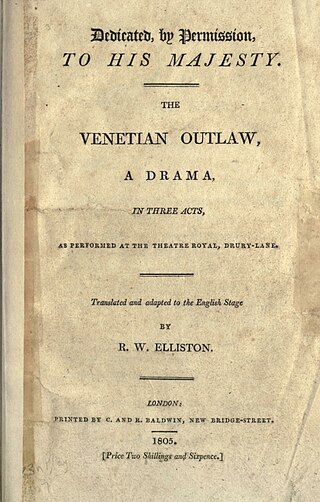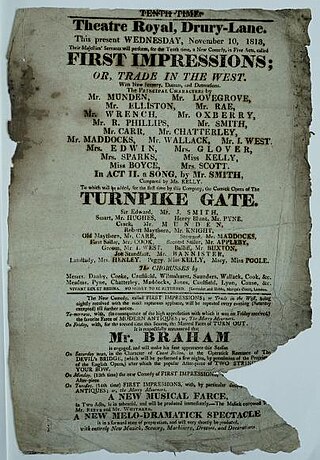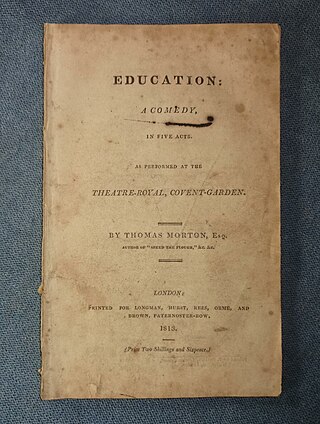Percy is a 1777 tragedy by the British writer Hannah More. It was inspired by the French play Gabrielle de Vergy by Pierre-Laurent Buirette de Belloy.
Marmaduke Watson was an English stage actor of the seventeenth century. Part of the King's Company based at the Theatre Royal, Drury Lane, he was one of the actors who sided with Charles Killigrew during a dispute in the company in 1677. In 1682 when the United Company was formed he left and went to Dublin to join the Smock Alley Theatre. He later returned to London where his final known performances were with Thomas Betterton's company at the Lincoln's Inn Fields Theatre.

The Curfew is a historical tragedy by the British writer John Tobin which was first published in 1807, three years after the author's death. It was staged by Richard Brinsley Sheridan at the Theatre Royal, Drury Lane in London premiering on 19 February 1807. The cast included William Barrymore as Hugh de Tracy, John Bannister as Robert, Henry Siddons as Bertrand, William Penley as Walter, Robert William Elliston as Fitzharding, Edmund John Eyre as Philip, Jane Powell as Matilda and Maria Duncan as Florence. It appeared at the Crow Street Theatre in Dublin on 1 April the same year. It is set during the Norman era.
Montague Talbot (1774–1831) was an Irish stage actor and theatre manager.

The Youthful Days of Frederick the Great is an 1817 stage melodrama by the British writer and actor William Abbot. It premiered at the Theatre Royal, Covent Garden in London on 2 October 1817. The cast included Daniel Terry as Frederick William, King of Prussia, Abbot as The Prince Royal, Daniel Egerton as Baron Kniphausen, Chapman as Count Seckendoff, Charles Connor as Anhalt, Charles Farley as Frederstoff and Harriet Faucit as Christine.

Manuel is an 1817 tragedy by the Irish writer Charles Maturin. It premiered at the Theatre Royal, Drury Lane in London on 8 March 1817. The original cast included Edmund Kean as Manuel, Count Valdi, Alexander Rae as De Zelos, James William Wallack as Torrismond, Charles Holland as Mendizabel, Thomas Cooke as Almorad, John Powell as Guide and Margaret Somerville as Victoria. The published work is dedicated to the writer Walter Scott. It takes place in the wake of the Battle of Las Navas de Tolosa in Spain. It failed to recapture the success of his debut play Bertram of the previous year, despite both starring Kean.

Bertram; or The Castle of St. Aldobrand is an 1816 Gothic tragedy by the Irish writer Charles Maturin, his first and most successful play. It premiered at the Theatre Royal, Drury Lane in London on 9 May 1816. The original case included Edmund Kean as Bertram, Alexander Pope as St Aldobrand, Charles Holland as Prior of St Anselm, John Powell as Monk, Thomas Cooke as Robber, Margaret Somerville as Imogine and Susan Boyce as Clotilda. The prologue was written by John Hobhouse. The 1827 opera Il pirata composed by Vincenzo Bellini uses a libretto by Felice Romani inspired by Maturin's work.

The Venetian Outlaw is an 1805 play by the British writer and actor Robert William Elliston. It premiered at the Theatre Royal, Drury Lane in London on 26 April 1805. The cast included James Grant Raymond as The Doge, William Barrymore as Count Orsono, Robert William Elliston as Vivaldi, William Powell as Alfieri, William Dowton as Calcagno, George Bartley as Carnevaro, George Cooke as Spalatro and Nannette Johnston as Rosara. The published play was dedicated by Elliston to George III. It was based on an 1801 French play L'Homme à Trois Visages by René-Charles Guilbert de Pixérécourt, which also inspired Rugantino by Matthew Lewis.

Rugantino is an 1805 melodrama by the British writer Matthew Lewis. An afterpiece, it was originally staged at the Theatre Royal, Covent Garden on 18 October 1805. It was inspired by the 1801 French play L'Homme à Trois Visages by René-Charles Guilbert de Pixérécourt. The original cast included Charles Murray as Andreas, Duke of Venice, John Liston as Meme, William Abbot as Poole, Henry Erskine Johnston as Rugantino and Isabella Mattocks as Camilla. It premiered in Ireland at Dublin's Crow Street Theatre on 26 January 1807. It was revived at Drury Lane in 1820 with a cast featuring James William Wallack as Rugantino, Thomas Cooke as Contarino, William Oxberry as Memme, John Pritt Harley as Stephane, Walter Maddocks as Harald, Sarah Sparks as Camilla and Charlotte Tidswell as Bettina.

John Bull is an 1803 comedy play by the British writer George Colman the Younger. It premiered at the Theatre Royal, Covent Garden on 5 March 1803. The original cast included George Frederick Cooke as Peregrine, Henry Erskine Johnston as Frank Rochdale, Charles Klanert as Williams, John Waddy as Lord Fitz-Balaam, William Thomas Lewis as Honourable Tom Shuffleton, John Henry Johnstone as Dennis Brulgruddery, John Fawcett as Job Thornberry, George Davenport as Mr Pennyman, John Emery as Dan, Nannette Johnston as Lady Caroline Braymore, Mary Ann Davenport as Mrs Bulgruddery and Maria Gibbs as Mary Thornberry. The prologue was written by Thomas Dibdin. Its Irish premiere was at Dublin's Crow Street Theatre on 18 May 1803.

The Poor Gentleman is an 1801 comedy play by the British writer George Colman the Younger. It premiered at London's Theatre Royal, Covent Garden on 11 February 1801. The original cast included Charles Murray as Lieutenant Worthington, Thomas Knight as Corporal Foss, Henry Erskine Johnston as Sir Charles Cropland, George Davenport as Warner, Joseph Shepherd Munden as Sir Robert Bramble, William Thomas Lewis as Frederick Bramble, John Waddy as Humphrey Dobbins, John Emery as Stephen Harrowby, John Fawcett as Doctor Ollapod, Maria Gibbs as Emily Worthington and Isabella Mattocks as Lucretia MacTab. It was revived in 1829 at the Theatre Royal, Drury Lane. In 1845 it appeared at the Chestnut Street Theatre in Philadelphia and the Park Theatre in New York.

Fazio is a tragedy by the British writer Henry Hart Milman. It was first published in 1815. An unauthorised adaptation was performed at the Surrey Theatre under the title The Italian Wife. Another unauthorised version was performed at the Theatre Royal, Bath. In 1818 Milman granted permission for the Theatre Royal, Covent Garden to stage the play. It premiered there on 5 February 1818. It starred Charles Kemble as Giraldi Fazio, Elizabeth O'Neill as Bianca, Daniel Egerton as the Duke of Florence, Charles Mathews as Gonsalvo, William Blanchard as Bartolo, Harriet Faucit as Aldabella and Charles Connor as Falsetto. A first Dublin performance took place at the Crow Street Theatre on 6 April 1818. Fanny Kemble later played Bianca in Britain and America, where she appeared at the Park Theatre in 1832. It was revived on both sides of the Atlantic over the following decades.

The Touchstone is an 1817 comedy play by the British writer James Kenney. It premiered at the Theatre Royal, Drury Lane in London on 3 May 1817. The original cast included Charles Holland as Finesse, James William Wallack as Garnish, John Pritt Harley as Paragon, William Dowton as Probe, William Oxberry as Croply, Frances Maria Kelly as Dinah Croply, Sarah Harlowe as Mrs. Fairweather and Frances Alsop as Miss Becky. Its Irish debut was at Dublin's Crow Street Theatre on 16 February 1818.

The Conquest of Taranto is an 1817 musical drama written by William Dimond with music composed by Michael Kelly. It appeared at the Theatre Royal, Covent Garden on 15 April 1817. The original cast featured Junius Brutus Booth as Rinaldo, William Macready as Valencia, Charles Mayne Young as Aben Hamet, Daniel Egerton as Gonzales, Sarah Booth as Oriana and Kitty Stephens as Rosalind. Macready was reportedly dissatisfied with his role, coveting that of Rinaldo, and unsuccessfully offered thirty pounds the Covent Garden manager Thomas Harris to release him during rehearsals. The first Dublin performance was at the Crow Street Theatre on 5 August 1817. It also appeared at the Federal Street Theatre in Boston and other American venues.
Cortez: Or, The Conquest of Mexico is an 1823 historical extravaganza by the British writer James Planché with music composed by Henry Bishop. It premiered at the Theatre Royal, Covent Garden on 5 November 1823. The original cast included John Cooper as Herdinando Cortez, Mary Ann Paton as Amazitli, Thomas Comer as Velaszque de Leon, William Chapman as Maxicazin, William Claremont as Tentile, George John Bennett as Teluxo, and Thomas Cooke as Oxoctzin. It also featured thirteen horses on stage and the trick rider Andrew Ducrow. The libretto by Planché is inspired by the Spanish conquest of Mexico under Hernán Cortés, and it enjoyed great success.
Adelaide is an 1814 tragedy by the Irish writer Richard Lalor Sheil. It premiered at the Crow Street Theatre in Dublin on 19 February 1814. The Dublin cast included Elizabeth O'Neill in the title role and Charles Connor as Count Luneburg. On 23 May 1816 it appeared for the first time in London's West End at the Theatre Royal, Covent Garden. The first London cast featured Elizabeth O'Neill reprising her Dublin role as Adelaide, Charles Mayne Young as Count St. Evermont, Charles Kemble as Count Lunenburg, William Abbot as Albert, Charles Murray as Godfrey, Daniel Egerton as Colbert, Sarah Egerton as Madame St. Evermont and Maria Foote as Julia. It takes place in Germany amidst emigres who have fled from the French Revolution.

First Impressions is an 1813 comedy play by the British writer Horatio Smith. It was first performed at the Theatre Royal, Drury Lane on 30 October 1813. The original cast included Joseph Munden as Sir Thomas Trapwell, Alexander Rae as Fortescue, Robert Elliston as Harcourt, William Lovegrove as Sir Toby Harbottle, William Oxberry as Sapling, Benjamin Wrench as Professor Trifleton, Julia Glover as Laetitia Freemantle, Elizabeth Rebecca Edwin as Lady Trapwell, Sarah Sparks as Lady Anemone, Frances Maria Kelly as Louisa and Susan Boyce as Phoebe. It lasted for fifteen performances on its original run. It's Irish premiere took place at the Crow Street Theatre in Dublin on 27 January 1814.

Education is an 1813 comedy play by the British writer Thomas Morton. It premiered at the Theatre Royal, Covent Garden in London on 27 April 1813. The original cast included Charles Mayne Young as Count Villars, Charles Mathews as Sir Guy Stanch, John Fawcett as Mr. Templeton, Charles Kemble as Vincent Templeton, John Liston as Suckling, William Barrymore as Damper, John Emery as Broadcast, Mary Catherine Bolton as Rosine, Maria Theresa Kemble as Mrs Templeton, Sarah Booth as Ellen and Mary Ann Davenport as Dame Broadcast.

The School of Reform is an 1805 comedy play by the British writer Thomas Morton. It premiered at the Theatre Royal, Covent Garden on 15 January 1805. The original cast included George Frederick Cooke as Lord Avondale, Joseph Shepherd Munden as General Tarragan, John Emery as Tyke, Charles Murray as Old Man, Maria Gibbs as Mrs St. Clair, Harriett Litchfield as Mrs Ferment and Mary Ann Davenport as Mrs Nicely. It was later staged at the Crow Street Theatre in Dublin.

The Gazette Extraordinary is a comedy play by the British writer Joseph George Holman, published and first performed in 1811. It premiered at the Theatre Royal, Covent Garden in London on 23 April 1811 The original cast included Charles Mayne Young as Lord De Mallory, Joseph Shepherd Munden as Heartworth, William Barrymore as William Clayton, John Fawcett as Doctor Suitall, Charles Murray as Randall, Nannette Johnston as Lady Julia Sandford, Mary Catherine Bolton as Miss Alford, Mary Ann Davenport as Mrs Leech and Sarah Booth as Ellen Meredith. It was acted eleven times during its initial run.















